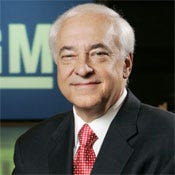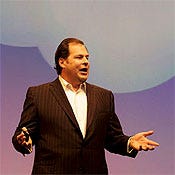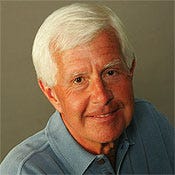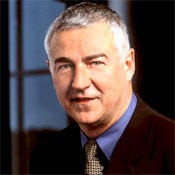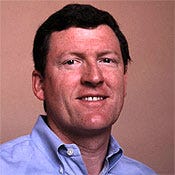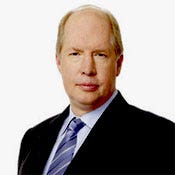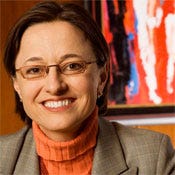Federal CTO Agenda: The Industry's Advice To Obama
Think big and transformational, advise two dozen industry leaders, from CEOs to CIOs. And get going now.

When President Obama fulfills his promise to name what he has described as the nation's "first chief technology officer," two enormous tasks will lay in front of that person. One is to drive the government to use information technology more effectively and efficiently. The second, even broader job is to influence how IT is leveraged for economic growth and national competitiveness everything from financing tech R&D to building out a national broadband infrastructure to helping tech employers develop and get access to the most talented people.
But the federal CTO won't be able to address, much less fix, every tech-related problem, so he or she will need to focus. But on what, exactly? For answers, we asked the nation's technology leaders a who's who of private-sector CEOs and CIOs, government IT leaders and thinkers what they want to top the federal CTO's agenda. Their thoughtful, passionate answers are a must-read for the Obama administration. They tend to fall into one of these two visions for the federal CTO: as inside-the-government change agent or leader of tech innovation more broadly.
Special Report: Industry Leader Advice to the Federal CTO
Federal CTO Agenda: The Industry's Advice To Obama
Down To Business: What Obama's CTO Should (And Shouldn't) Focus On
How Federal IT Leadership Evolved Under Bush
Image Gallery: 26 Tech Leaders On Fed CTO Priorities
At the top of the five-point priority list laid out by General Motors CIO Ralph Szygenda (see box, right) is the need for the government to standardize IT and processes across government agencies, to promote "optimal and cost-effective sharing of information."
Chiquita Brands CIO Manjit Singh thinks the first priority must be to update the country's crumbling tech infrastructure, particularly where it poses the biggest risk, like air traffic control. "I don't think the average person has a comprehension of how old and how broken those systems are," says Singh, a self-described aviation buff. CA CEO John Swainson says many barriers to delivering better government services "stem from the complexities of what is a stovepiped and messy set of federal IT infrastructures," so one of the CTO's first jobs must be to simplify and streamline and automate, where possible the federal IT systems and processes. Salesforce.com CEO Marc Benioff lays out the steps for the government to take advantage of cloud computing.
On the other end of the spectrum are those who want the CTO to steer clear of government's use of IT, and to instead focus on how technology can improve U.S. competitiveness in a global economy. Sybase CEO John Chen goes so far as to say he'd like to see the post called "chief innovation officer," to avoid any temptation to step into issues such as guiding tech standards.
|
|
| |
|
Among the issues Chen wants the CTO to focus on are technology education, immigration and the tech talent pool, trade and national competitiveness, private-public cooperation, and tax policy to encourage R&D. The risk is that the CTO will "jump into technical stuff, under pressure of getting tangible, short-term results, and miss the focus on frameworks and the innovation environment," he says.
Get alerts on government IT news as it happens.
Sign up here.
Some see the role as directly fueling innovation. "Why couldn't the CTO be considered a bit of a venture capitalist?" says Dave Duffield, founder of PeopleSoft and more recently software-as-a-service provider Workday. Duffield cites the futurist thinking and products that came out of AT&T Bell Labs and Xerox PARC, both recipients of federal funding, or the federally supported nanotechnology research now happening at Cornell University (which Duffield himself seeded with a $20 million donation).
Tien Tzuo, CEO of tech startup Zuora, wants the federal CTO to push for development of "new technologies that increase the competitiveness of the United States." That effort could include the government developing its own social networking platform geared to the needs of governments and citizens, or developing other technologies to let "everyone participate in the political process online."
Robert Atkinson, president of the Information Technology and Innovation Foundation, maps out two main priorities for the federal CTO. First, he or she must function as a "CIO for the federal enterprise," Atkinson says, by coordinating security, for instance, and establishing a common look and feel for government Web sites. Second, the CTO must push federal agencies to drive broader "digital transformation" of the U.S. economy for example, the General Services Administration could spur better use of IT by the U.S. construction industry if it reformed how it does construction procurement.
Is there no signature issue people can agree on? Surely, better broadband leaps to the top, right? Many of the leaders we spoke to did cite improving Internet access speeds, reach, affordability as a key issue. But just one in five people in our InformationWeek Analytics survey of 853 business technology professionals cite it as an urgent priority, far behind issues of security, for example.
|
|
| |
|
And some tech leaders think that one's well covered already. "Stay away from broadband," advises Atkinson. "If you think of digital transformation as being 100, broadband currently takes up about 75% to 80% of the energy and thinking in this space in Washington. Other people will do broadband. The real attention should be on these other digital transformation issues."
In addition to furthering the goals of the Obama administration, the federal CTO like any good CIO or CTO will have to take a cost/benefit-based "balanced portfolio" approach in selecting what to focus on, says Patricia Coffey, VP of technology with Allstate Insurance and president-elect of the Society for Information Management. Eliminating system redundancies and deduplicating data are usually "fertile ground for quick wins," Coffey says. "And those successes usually free up funding for other things," whether it's improving government services or taking on issues such as the country's tech competitiveness.
|
|
| |
|
Obama has only hinted about what's on his mind (and hadn't named a nominee as InformationWeek went to press). On his campaign's Web site, he promises to appoint a CTO "to ensure that our government and all its agencies have the right infrastructure, policies, and services for the 21st century." The 3,000-word outline also lays out an agenda that ranges from education to trade policy to competitiveness. The administration hasn't said when it will appoint a CTO or where this position will reside inside a department, in a Cabinet-level or other senior advisory role. One thing's clear: Obama will disappoint many tech leaders if the federal CTO sticks to a narrow agenda or is given less than a high-powered position.
Some think even a federal CTO isn't expansive enough, or won't be for long. SAS Institute CEO Jim Goodnight wonders if a Cabinet-level position will be needed to focus on U.S. technology competitiveness, comparing the challenge to the space race. United Stationers CIO Dave Bent likes the sound of a dedicated Information Technology Agency. "Imagine when cloud computing evolves into a true commodity service," Bent says. "It's the equivalent of having a secretary for energy." The most recent addition to the Cabinet was the secretary of Homeland Security, created by President George W. Bush in 2002.
Federal Change Agent
The federal government spends more than $70 billion on IT, an amount that doesn't even include the armed forces or intelligence. With so much spending and organizational complexity, the federal government is "the best organization in the economy to take advantage of technology" to improve processes and decision-making, says Mark Forman, who under Bush was the first "e-government czar" and is now a consultant with KPMG.
In our survey, 31% say improving the government's use of technology is the single most important agenda item for the incoming CTO, well ahead of improving education in science and technology (19%) and encouraging industry-driven technology (16%).
|
|
| |
|
Bob Otto, former CIO of the U.S. Postal Service and now a consultant with Agilex Technologies, says part of the CTO's job must be to standardize and simplify the layers of federal IT management and the wide variety of technologies used in the federal government. "E-government was supposed to make information from every agency available to the public in an easier way," Otto says. "Now the information from the agencies is on the Web, but citizens still don't know where to go to find it."
SAS's Goodnight says the feds have the same problem as many companies: too many silos of data not shared or linked to produce better business outcomes. An ideal federal CTO would take on a "maverick" role to overcome that problem, he says. Forman sees the same problem and thinks service-oriented architecture is part of the answer by allowing for easier integration through a more consistent architecture. But the biggest gains, he says, will be made by leveraging Web 2.0, giving everyday government workers tools for "solving problems faster and making better decisions."
Both GM's Szygenda and former Chase CIO Denis O'Leary think the government needs to pay its IT leaders and workers better given what they're being called on to accomplish or, as O'Leary puts it, "to allow for solutions other than chronic outsourcing."
Collaborate And Save
A federal CTO could drive changes that help cash-strapped state governments, says Carolyn Lawson, CIO of the California Public Utilities Commission. State agencies often have reporting requirements for different programs the feds fund, but there aren't metadata standards that would make it easy for states to exchange research. So each state spends "way too much money" researching the same questions, she says. Standards for federal reporting would let states collaborate to build "cloud or cloudish solutions," Lawson says. "Built once, used by many: We're talking hundreds of millions or even billions of dollars in savings nationally."
There's huge opportunity in having the federal CTO help the government use IT better, but there's the risk that he or she will spend too much time "in the bureaucratic weeds," says Peter Cleveland, Intel's VP of public policy. Instead, the new CTO should be tasked with a "broad-sweeping transformational agenda" that includes broadband connectivity, health care IT, public-safety technology, government transparency, and "outside-the-box" ways of using IT to protect the environment.
|
|
| |
|
Driving use of health care IT, such as electronic medical records, is on a lot of executives' federal CTO wish lists. One goal there is to drive down costs, since the government is a big direct provider of care. And the government could use its own operations, including the influence of Medicaid and Medicare, to encourage both e-records adoption and data-sharing standards. The government already is pushing on those levers e-records and other health care IT flourish at Veterans Affairs hospitals, for example so even a powerful CTO faces a long slog in driving adoption by private-sector doctors.
Most IT vendor execs, of course, want the federal CTO to focus on the stuff they make, especially as the stimulus plan kicks in, boosting tech spending amid weakening business demand. Dirk Meyer, CEO of Advanced Micro Devices, puts among his top four agenda items IT infrastructure upgrades in supercomputing, citing the Department of Energy's Jaguar supercomputer, which runs on AMD chips. EMC CTO Jeff Nick cites virtualization, data deduplication, information security, content management, and solid-state data center technology as emerging technologies the CTO must consider to improve government IT. CA's Swainson points to the need for broad improvements in IT management to reduce complexity and problems caused by stovepiped systems. Benioff, with an acknowledged self-interest, ticks off the steps a CTO must take to let the feds tap into cloud computing: Launch pilot cloud computing projects across agencies to understand the benefits and limitations for government needs; use cloud tools to solicit citizen input; and make sure rules around procurement, security, and share services don't box out software as a service.
|
|
| |
|
Cisco CTO Padmasree Warrior emphasizes a number of big policy initiatives better broadband, health IT tools to cut costs and improve care, and a smart energy grid to better manage power use all of which will require advanced networking technology.
Warrior says better broadband "will be the backbone of future economic growth," yet the business technology pros we surveyed didn't rank it a particularly high priority. Just 20% consider it extremely urgent, behind priorities such as improving cybersecurity (47%) and encouraging private-sector tech R&D (25%). Paul Bell, president of Dell's public-sector business, considers broadband policy critical but thinks the FCC has it on track, so the federal CTO should focus elsewhere.
Infrastructure Upgrades
BMC CEO Bob Beauchamp thinks the CTO's No. 1 focus should be at an even more fundamental level than broadband. Beauchamp points to undersea telecom cable cuts last year in the Mediterranean Sea that left parts of India without Internet connectivity for days. "The U.S. has similar exposures," he says. "The information infrastructure and connectivity could be at risk." With business and government so dependent on IT, the United States needs to consider connectivity a matter of national security, he says.
Fifty-one percent of respondents to our survey consider securing critical infrastructure power grid, transportation, communications an extremely urgent priority, and another 31% consider it somewhat urgent. Improving cybersecurity comes close, but that task is going to Melissa Hathaway, who was just named acting senior director for cyberspace for the National Security and Homeland Security councils, leading a 60-day review of whether the federal government aligns security strategy across agencies and with the private sector.
|
|
| |
|
Beauchamp doesn't think the federal CTO needs to champion efforts like using Web 2.0 technologies to improve government service or openness, or even using technology like BMC makes to automate IT operations and improve efficiency. "If you have good people in place, if they're well managed, it would be natural for them to embrace this," he says. Dell's Bell agrees that agency CIOs are doing that themselves, but he says the CTO could help coordinate such efforts in a way that makes them more effective.
Information and system security is a typical problem: Plenty of departments and agencies have made their systems more secure, but there's little in terms of standards, which adds complexity and cost and makes information sharing more difficult. While there are ongoing efforts to collaborate, "it's a huge task of coordinating among peers," says Bell. "Without that role at the top, deciding what these standards are, it's hard to implement."
More Important: Innovation
No one disputes there's a huge opportunity to improve the government's use of IT. But many see a higher calling for Obama's CTO. "Technology is a piece, and a means to that end, but the focus should be on innovation," says Sybase CEO Chen. He envisions the CTO working to improve the economic environment for technology innovation; foster public-private tech research partnerships; improve education in math, science, and technology; and develop trade policies related to green technology standards. Among the broader tech population, however, only 16% of business technology pros see encouraging industry-driven tech innovation as the CTO's No. 1 priority.
The fed CTO shouldn't try to influence U.S. technology standards, Chen argues, since industry can work those out on its own. However, the CTO likely will have to take on other countries' efforts to dictate standards that give their tech industries an advantage.
Immigration could prove a flash-point issue. U.S. tech employers lobby to import talent from abroad, but as unemployment climbs, the pressure's already mounting for limits.
Still, some tech leaders will push this issue. "Whether it's Google or eBay or Intel or Yahoo, all of these companies were started by immigrants who came to the United States because we were the magnet for great innovation," says Xerox CTO Sophie Vandebroek, herself an immigrant from Belgium. She says Xerox struggles to find Americans with Ph.D.s in microelectronics, one reason she puts rebuilding the U.S. science and education system and increasing the number of H-1B visas on her list of federal CTO priorities. Like Chen, she would focus the CTO on long-range goals, including making R&D tax credits permanent, investing in green and health care technology, improving interagency information sharing, and investing more in basic science research.
More likely than pushing for more open immigration is for a CTO to evangelize for science and technology education, something John Halamka, CIO of Harvard Medical School and the CareGroup Health Systems, puts among his top goals. A data point he cites for urgency: Only 5% of U.S. college graduates are pursuing engineering careers; in South Korea, it's 38%. AMD CEO Meyer cites a study that the U.S. produces 225,000 college graduates a year in science, tech, engineering, and math, but by 2015 will need 400,000 a year. "The technology industry in the U.S. is becoming increasingly vulnerable to this widening gap," he says, calling on the CTO to find creative ways to get students interested early in science and tech careers.
Dan Mintz, who spent three years as CIO of the Department of Transportation under Bush, says the federal CTO must focus on fostering the use of technology among citizens and improving the country's global standing in math and science education. The CTO should stay out of tech implementation and policy-making "that steps on toes of others already doing that," he says.
EMC's Nick sees the CTO playing the role for the Cabinet that a private-sector CTO does for the board and executive team: helping Cabinet members understand the future of particular technologies so they can fund tech R&D and projects using similar criteria. While industry leaders don't speak with one voice, they generally agree on this: If the federal CTO isn't given clear or sufficient authority, he or she will fail. "What's required is a unique combination of the person's ability and persistence and the clarity of the role that's carved out," says Allstate's Coffey.
Dell's Bell worries that the position will be set up "as too much of a coordinator role, without the teeth to make things happen." Again and again, tech leaders we spoke with warn against a symbolic or pulpit role, or a CTO who's toiling in the trenches. "Transformation" is a description that comes up more than any other.
Whatever the CTO's agenda, Mr. President, think big.
--By Chris Murphy, with J. Nicholas Hoover, Mike Fratto, Mary Hayes Weier, Marianne Kolbasuk McGee, Rob Preston, and Roger Smith
Continue to the sidebar:
How Federal IT Leadership Evolved Under Bush Image Gallery:
26 Tech Leaders On Fed CTO Priorities
About the Author(s)
You May Also Like


